Ruiz-Joshua 2: When heavyweight champions ruled the world
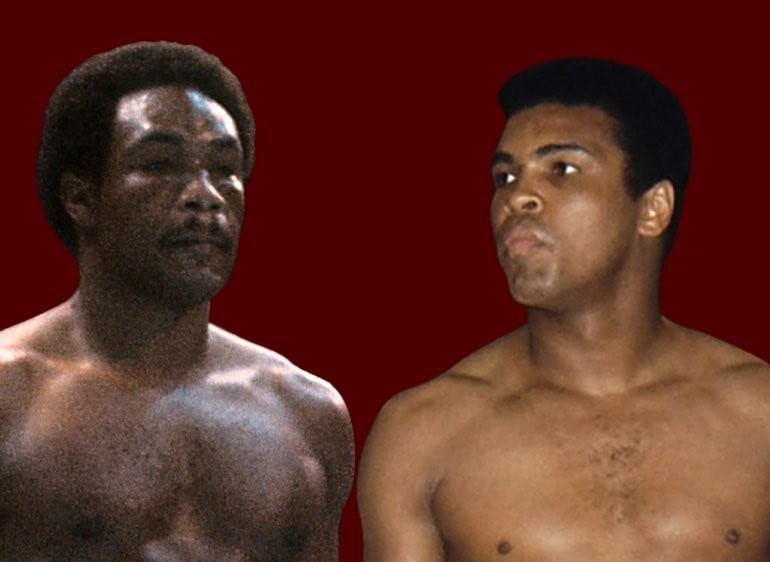
Some of the finest heavyweight champions in boxing history never fought outside of North America. The likes of Jack Dempsey, Joe Louis and Rocky Marciano did not have a single paid contest outside of the United States, and their respective legacies have never suffered as a result.
The great Jack Johnson contested title fights in Australia, Cuba and France, but the first heavyweight champion to travel seriously during the television age was Muhammad Ali, who took part in a European tour in 1966. A prime Ali ventured to the U.K. for stoppage wins over Henry Cooper and Brian London, before halting tricky southpaw Karl Mildenberger in Germany. Ali’s legacy would have been stellar regardless, but his globetrotting escapades, which went into overdrive during the 1970s, certainly added to his mystique.
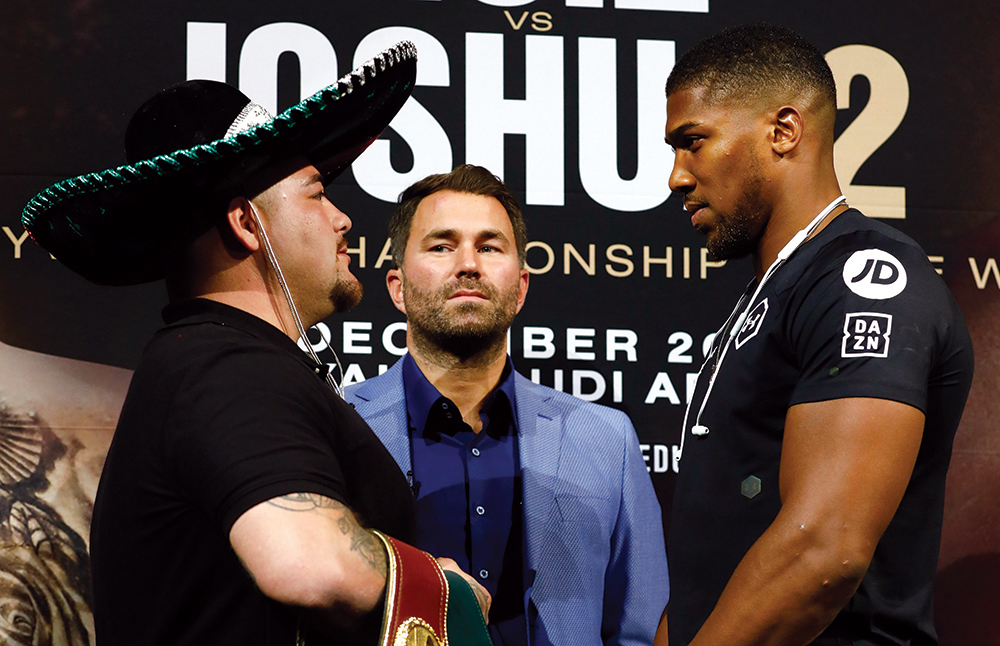
Photo by Jeff Zelevansky/Getty Images)
On Saturday, unified IBF, WBA and WBO heavyweight titleholder Andy Ruiz will take part in a rematch against British superstar Anthony Joshua. In June, Ruiz survived a knockdown to floor Joshua four times en route to a shuddering seventh-round stoppage. That stunning upset went down within the familiar confines of Madison Square Garden, whereas the sequel will take place in the unlikely setting of Diriyah, Saudi Arabia.
This is not the first time that a huge heavyweight roadshow has turned up in a new part of the world. The 1970s saw more of it than any other decade as governments sought to establish themselves as tourist hotspots, shake off negative press or both. Here we revisit seven heavyweight championship bouts that were a first for the host nation:
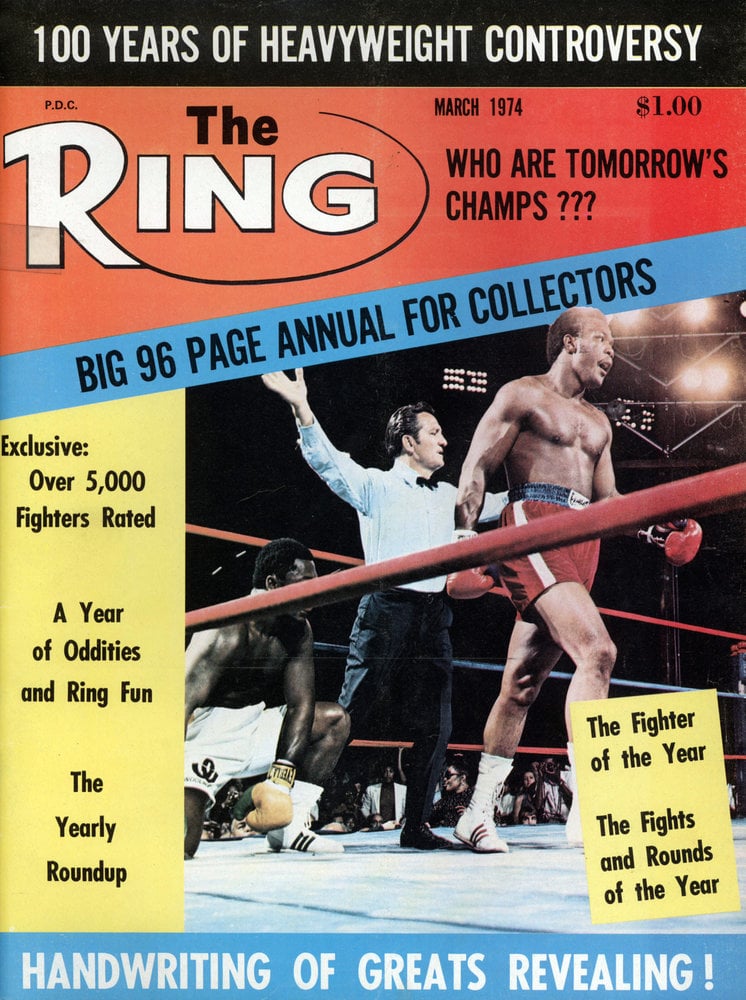 Joe Frazier vs. George Foreman
Joe Frazier vs. George Foreman
Date / Venue: January 22, 1973 / National Stadium, Kingston, Jamaica
Titles: Ring Magazine/ WBA/ WBC (Undisputed)
The Jamaican government outbid Madison Square Garden to secure this battle of unbeatens. Frazier was the defending champion, a formidable left hook destroyer, who had solidified his glamour division superiority by besting Ali in “The Fight of the Century” in 1971. Foreman had succeeded Frazier as Olympic champion in 1968 and built a reputation as a fierce knockout artist, but this was the fight that made him. With less than two minutes gone in Round 1, Foreman dropped Frazier with a right-hand bomb, which was the first of six knockdowns scored in just five minutes and 26 seconds of fight time. It remains one of the most devastating and dominant heavyweight title wins in boxing history. A huge crowd of 36,000 attended the bout dubbed “The Sunshine Showdown”.
Result: Foreman TKO 2
George Foreman vs. Jose Roman
Date / Venue: September 1, 1973 / Nippon Budokan, Tokyo
Titles: Ring Magazine/ WBA/ WBC (Undisputed)
The proverbial lamb to the slaughter. Puerto Rican contender Jose Roman was ranked inside the Top 10 by both governing bodies (just), but he was 5-foot-10, 196 pounds and his 44-7-1 record was padded. Foreman, at 6-foot-3 and 219 pounds, was a monster by comparison. The ring was a mere 17-foot-square, which was akin to stuffing a king cobra in a hamster cage. In the opening round, Foreman decked the overmatched challenger with a torrid barrage, hit him while he was down and closed out with two more knockdowns, the last of which – a right uppercut – put Roman out cold. Japan had seen Muhammad Ali outpoint Mac Foster a year earlier, but Foreman-Roman was the first heavyweight championship fight to be held in “The Land of the Rising Sun”.
Result: Foreman KO 1
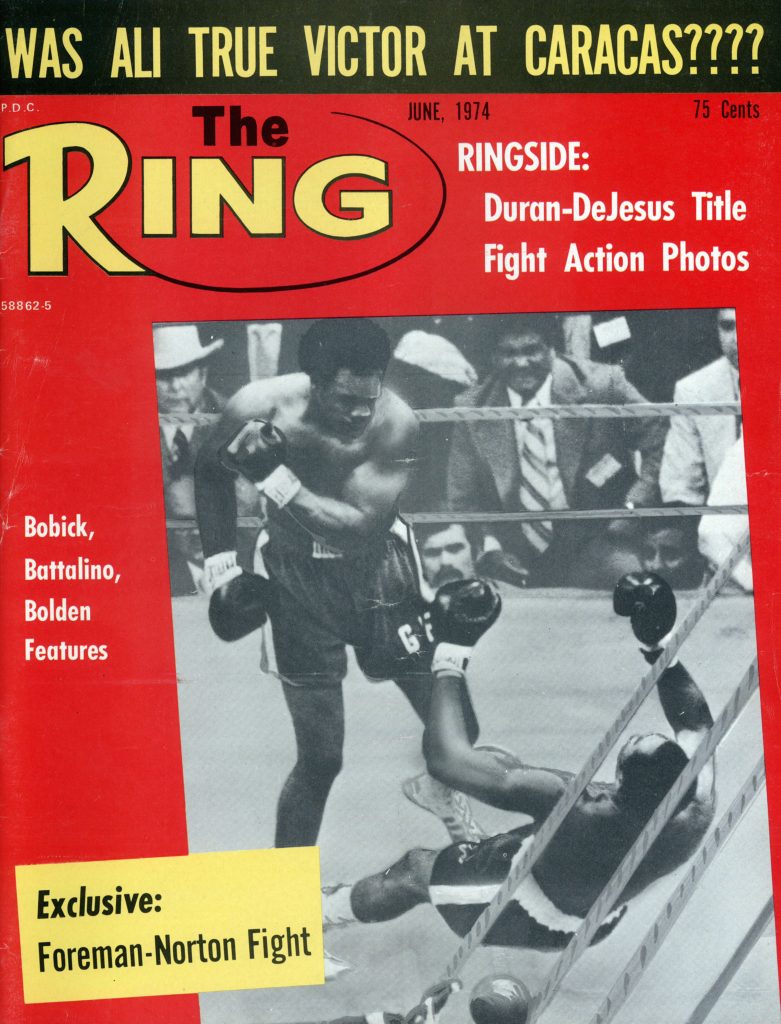 George Foreman vs. Ken Norton
George Foreman vs. Ken Norton
Date/ Venue: March 26, 1974 / El Poliedro, Caracas, Venezuela
Titles: Ring Magazine/ WBA/ WBC (Undisputed)
Norton was a terrific heavyweight, who had broken the jaw of former champion Muhammad Ali en route to outpointing him almost a year earlier to the day. While Ali had claimed revenge via split decision in the interim, Norton was still expected by many to provide Foreman with a stern test. He didn’t have a prayer. The champion slipped into top gear in Round 2, flooring Norton three times for yet another spectacular knockout victory. Foreman-Norton became known as “The Caracas Caper”, largely due to both champion and challenger having to pay huge sums of tax before they were allowed to exit the country. The event organizers had promised that no tax would be claimed, but the Venezuelan government had other ideas.
Result: Foreman TKO 2
George Foreman vs. Muhammad Ali
Date/ Venue: October 31, 1974 / Stade du Mai 20, Kinshasa, Zaire
Titles: Ring Magazine/ WBA/ WBC (Undisputed)
It’s now boxing’s favorite nursery rhyme – Muhammad Ali’s most glorious moment – but coming in, “The Rumble in the Jungle” was considered a mismatch. And for good reason. Foreman had thrashed Frazier and Norton, the only two men to score victories over Ali. Foreman, at 25 years of age, was seven years Ali’s junior. Ali had lost some footspeed and was now available to be hit. This was a disaster waiting to happen and the challenger was 6-1 against in a two-horse race. At 4:00 am local time, in the first heavyweight championship bout held on the African continent, Ali improvised the now famous rope-a-dope routine. Foreman’s blows either struck the less vulnerable areas of Ali’s anatomy or cut holes through the air. When the champion had finally ran out of fuel, Ali seized the moment, closing the show with a stunning combination, punctuated by a perfect right hand. Hall of Fame promoter Don King isn’t what you would call popular, but you can thank him for what was arguably the greatest moment in sporting history and its locale.
Result: Ali KO 8
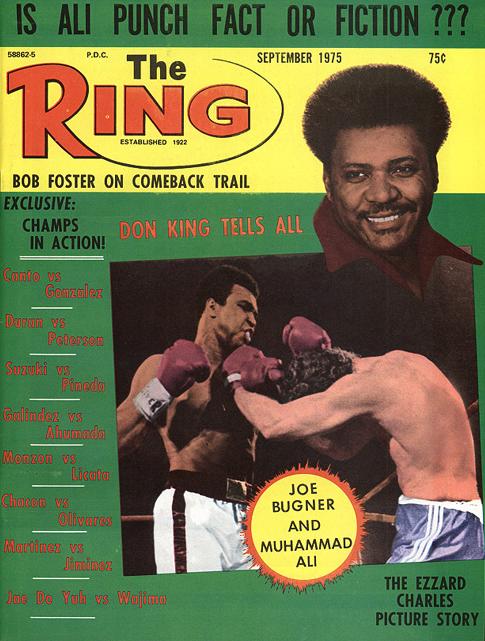 Muhammad Ali vs. Joe Bugner 2
Muhammad Ali vs. Joe Bugner 2
Date/ Venue: July 1, 1975 / Merdeka Stadium, Kuala Lumpur, Malaysia
Titles: Ring Magazine/ WBA/ WBC (Undisputed)
The rip-roaring success of “The Rumble in the Jungle” led to a multitude of other governments bidding in earnest for Ali title fights. Madison Square Garden and Las Vegas were now finding it much more difficult to front the money necessary to host these events and the heavyweight championship of the world was now – finally – a global property. Joe Bugner, a British, Commonwealth and European champion, had taken Ali the distance in a non-title fight in February 1973, but he was given very little chance of victory. Malaysia, whose official religion is Islam, didn’t particularly care. Ali was Muslim, the most famous man on earth and treated like a God. Conversely, Bugner received death threats ahead of the fight, which took place at 10:00am local time. Snipers were deployed around the perimeter of the stadium to protect the challenger from anything dangerous other than Ali’s fists, which connected often enough to earn him a comfortable decision victory.
Result: Ali UD 15
Muhammad Ali vs. Joe Frazier 3
Date/ Venue: October 1, 1975 / Araneta Coliseum, Manila, Philippines
Titles: Ring Magazine/ WBA/ WBC (Undisputed)
Ali figured his old nemesis was shot and ready for the taking. That turned out to be one very big mistake. Frazier, who was obsessed with dethroning Ali and punishing him for years of verbal abuse, whipped himself into perfect fighting shape and was willing to die for victory. Ali, despite being in good condition, was beset with marital problems and a variety of other distractions. Arguably the greatest heavyweight title fight in boxing history took place amid a backdrop of civil conflict and poverty in a country that was still under the fierce dictatorship of Ferdinand Marcos. Ali and Frazier took what was left out of each other’s championship tank and the searing heat took the rest. “The Thrilla in Manila” was all-out war and neither man was ever the same.
Result: Ali RTD 14
Gerry Coetzee vs. John Tate
Date/ Venue: October 20, 1979 / Loftus Versfield Stadium, Pretoria, South Africa
Titles: WBA
What was left of Muhammad Ali outpointed Leon Spinks in New Orleans in September 1978 to win the championship for an unprecedented third time. Ali had no intention of defending it, however, and after some financial recompense from promoter Bob Arum (reportedly $300,000), he relinquished the WBA belt in June 1979. The South African government was eager to host a bout for the vacant title, so eager in fact that they would forgo apartheid for a few hours in order for white-Afrikaner Coetzee to face African-American Tate. This bout, attended by over 80,000 spectators, marked the first time that black South Africans were allowed inside the Loftus Versfield Stadium and they would see Tate crowned WBA titleholder after 15 rounds. Due to the controversial nature of the bout, the national broadcaster declined to televise.
Result: Tate UD 15
Tom Gray is Associate Editor for Ring Magazine. Follow him on Twitter: @Tom_Gray_Boxing
READ THE LATEST ISSUE OF THE RING FOR FREE VIA THE NEW APP NOW. SUBSCRIBE NOW TO ACCESS MORE THAN 10 YEARS OF BACK ISSUES.















